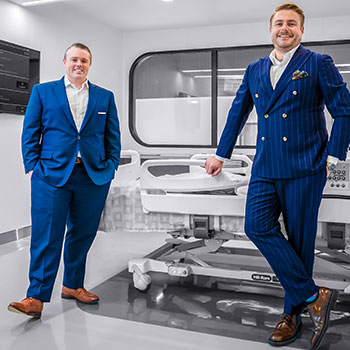
Patrick Fenningham, 31
BS biomedical engineering ’11
Chief Product Officer, EIR Healthcare
Grant Geiger, 31
BS/BA international business and marketing ’11
Founder and CEO, EIR Healthcare
Smarter, Faster Hospital Spaces
Grant Geiger and fellow alumnus Patrick Fenningham have created a modular patient room model that will allow hospitals to outbuild obsolescence.
When Grant Geiger’s father worked as an industrial engineer in hospitals, he saw problems: It took too long to build medical facilities, and technologies often went out of date before construction was even completed.
“He saw there were significant areas for improvement in the way that hospitals were built and designed,” Geiger says. “I wanted to continue to build on his legacy.”
The change I’d most like to see in the world is…
“improved access to health care for all people.”
— Grant Geiger
Today he is doing just that. His startup EIR Healthcare designs and fabricates modular hospital rooms: They’re quicker to build, and they have key technologies baked right in. In 2018 the firm unveiled MedModular, touted as the world’s first application of prefabrication and modular technology to hospital rooms. The product aims to ensure faster delivery and build times, and to minimize budgets.
While the medical industry has focused heavily on new technologies, little attention has been paid to physical spaces until EIR Healthcare came along.
“This solution changes the entire industry, marrying construction and health care technology together in one solution, and we’re doing it in an industry that really hasn’t changed in 60 or 70 years,” says Chief Product Officer Patrick Fenningham, who graduated alongside Geiger in 2011 and is helping to scale the company. Modular construction “offsets the installation time for these new technologies, and it reduces the overall construction time, which allows the hospitals to use the latest and greatest technologies two to three years sooner.”
Geiger (BS/BA international business and marketing ’11) credits his co-op experiences with engineering giant Siemens, along with a study-abroad session in Berlin, in setting him on his present path. “Both of those experiences helped me to understand the global economy, and they allowed me to try new things, to take on new roles,” he says. “I learned that in the health care space there was a significant wave of change coming. As part of teams launching new products and new technology at Siemens, I was able to experience firsthand the nature of those changes.”
The change I’d most like to see in the world is…
“technological advancements in housing, education and health care to ensure that no matter where in the world you live, everyone has access to the basic necessities of life.”
— Patrick Fenningham
Fenningham — who completed a bachelor’s degree in biomedical engineering in the School of Biomedical Engineering, Science and Health Systems — did his co-op work in Johnson & Johnson’s medical device program, where he delved into efficient manufacturing processes.
“I got exposed to a lot of different aspects — medical devices, neuroscience, diagnostic equipment, ultrasound, biochemistry. All of those together tie into different areas of a hospital,” he says.
The company expects to deliver its first construction in 2020 to a confidential client. Looking ahead, the two expect to introduce additional product offerings in the near future. “We will launch Version 2.0 next year and will expand into the laboratory market, specifically diagnostic labs,” Geiger says.
Modular construction may do more than just streamline the building of new hospitals: It could radically reshape health care delivery. “It will improve the health care experience, patients will leave feeling they had a better time in the facility, and we believe it will lead to better outcomes as well,” Geiger says. — Adam Stone



